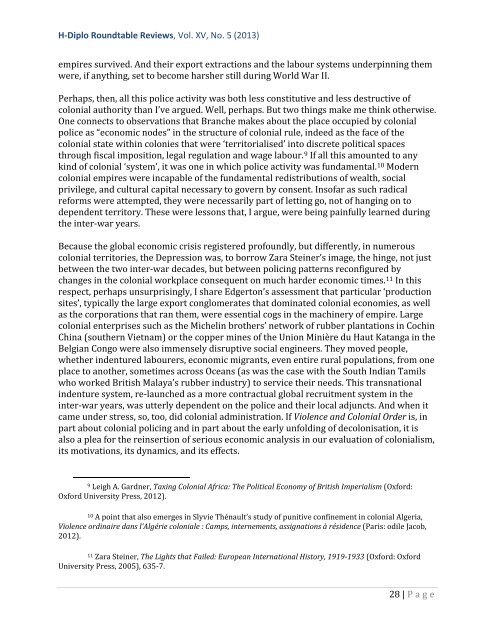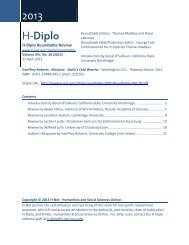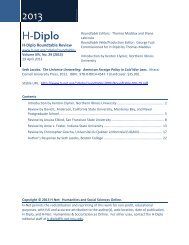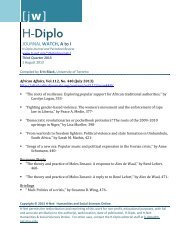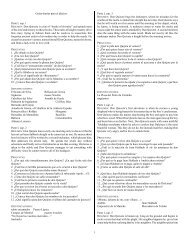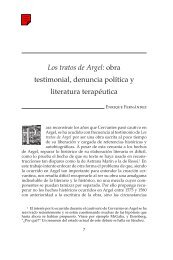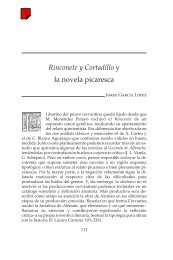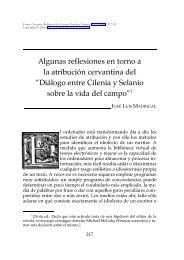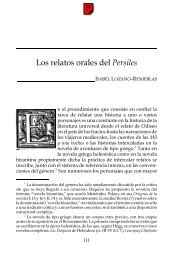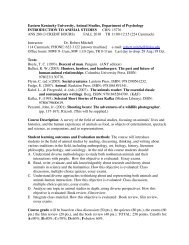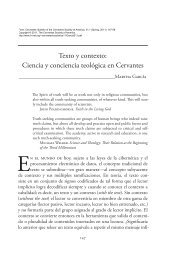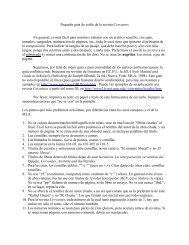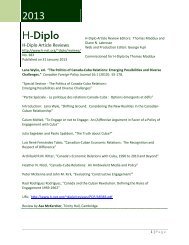H-Diplo Roundtable on Martin Thomas. Violence and ... - H-Net
H-Diplo Roundtable on Martin Thomas. Violence and ... - H-Net
H-Diplo Roundtable on Martin Thomas. Violence and ... - H-Net
Create successful ePaper yourself
Turn your PDF publications into a flip-book with our unique Google optimized e-Paper software.
H-<str<strong>on</strong>g>Diplo</str<strong>on</strong>g> <str<strong>on</strong>g>Roundtable</str<strong>on</strong>g> Reviews, Vol. XV, No. 5 (2013)<br />
empires survived. And their export extracti<strong>on</strong>s <strong>and</strong> the labour systems underpinning them<br />
were, if anything, set to become harsher still during World War II.<br />
Perhaps, then, all this police activity was both less c<strong>on</strong>stitutive <strong>and</strong> less destructive of<br />
col<strong>on</strong>ial authority than I’ve argued. Well, perhaps. But two things make me think otherwise.<br />
One c<strong>on</strong>nects to observati<strong>on</strong>s that Branche makes about the place occupied by col<strong>on</strong>ial<br />
police as “ec<strong>on</strong>omic nodes” in the structure of col<strong>on</strong>ial rule, indeed as the face of the<br />
col<strong>on</strong>ial state within col<strong>on</strong>ies that were ‘territorialised’ into discrete political spaces<br />
through fiscal impositi<strong>on</strong>, legal regulati<strong>on</strong> <strong>and</strong> wage labour. 9 If all this amounted to any<br />
kind of col<strong>on</strong>ial ‘system’, it was <strong>on</strong>e in which police activity was fundamental. 10 Modern<br />
col<strong>on</strong>ial empires were incapable of the fundamental redistributi<strong>on</strong>s of wealth, social<br />
privilege, <strong>and</strong> cultural capital necessary to govern by c<strong>on</strong>sent. Insofar as such radical<br />
reforms were attempted, they were necessarily part of letting go, not of hanging <strong>on</strong> to<br />
dependent territory. These were less<strong>on</strong>s that, I argue, were being painfully learned during<br />
the inter-war years.<br />
Because the global ec<strong>on</strong>omic crisis registered profoundly, but differently, in numerous<br />
col<strong>on</strong>ial territories, the Depressi<strong>on</strong> was, to borrow Zara Steiner’s image, the hinge, not just<br />
between the two inter-war decades, but between policing patterns rec<strong>on</strong>figured by<br />
changes in the col<strong>on</strong>ial workplace c<strong>on</strong>sequent <strong>on</strong> much harder ec<strong>on</strong>omic times. 11 In this<br />
respect, perhaps unsurprisingly, I share Edgert<strong>on</strong>’s assessment that particular ‘producti<strong>on</strong><br />
sites’, typically the large export c<strong>on</strong>glomerates that dominated col<strong>on</strong>ial ec<strong>on</strong>omies, as well<br />
as the corporati<strong>on</strong>s that ran them, were essential cogs in the machinery of empire. Large<br />
col<strong>on</strong>ial enterprises such as the Michelin brothers’ network of rubber plantati<strong>on</strong>s in Cochin<br />
China (southern Vietnam) or the copper mines of the Uni<strong>on</strong> Minière du Haut Katanga in the<br />
Belgian C<strong>on</strong>go were also immensely disruptive social engineers. They moved people,<br />
whether indentured labourers, ec<strong>on</strong>omic migrants, even entire rural populati<strong>on</strong>s, from <strong>on</strong>e<br />
place to another, sometimes across Oceans (as was the case with the South Indian Tamils<br />
who worked British Malaya’s rubber industry) to service their needs. This transnati<strong>on</strong>al<br />
indenture system, re-launched as a more c<strong>on</strong>tractual global recruitment system in the<br />
inter-war years, was utterly dependent <strong>on</strong> the police <strong>and</strong> their local adjuncts. And when it<br />
came under stress, so, too, did col<strong>on</strong>ial administrati<strong>on</strong>. If <strong>Violence</strong> <strong>and</strong> Col<strong>on</strong>ial Order is, in<br />
part about col<strong>on</strong>ial policing <strong>and</strong> in part about the early unfolding of decol<strong>on</strong>isati<strong>on</strong>, it is<br />
also a plea for the reinserti<strong>on</strong> of serious ec<strong>on</strong>omic analysis in our evaluati<strong>on</strong> of col<strong>on</strong>ialism,<br />
its motivati<strong>on</strong>s, its dynamics, <strong>and</strong> its effects.<br />
9 Leigh A. Gardner, Taxing Col<strong>on</strong>ial Africa: The Political Ec<strong>on</strong>omy of British Imperialism (Oxford:<br />
Oxford University Press, 2012).<br />
10 A point that also emerges in Slyvie Thénault’s study of punitive c<strong>on</strong>finement in col<strong>on</strong>ial Algeria,<br />
<strong>Violence</strong> ordinaire dans l'Algérie col<strong>on</strong>iale : Camps, internements, assignati<strong>on</strong>s à résidence (Paris: odile Jacob,<br />
2012).<br />
11 Zara Steiner, The Lights that Failed: European Internati<strong>on</strong>al History, 1919-1933 (Oxford: Oxford<br />
University Press, 2005), 635-7.<br />
28 | P age


